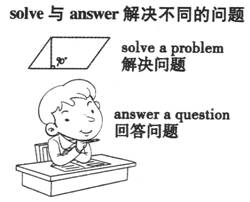字号: 默认 大 中 小
一、知识概述
1.学习和掌握本单元出现的生单词、词组和句型。
2.学习和掌握含有情态动词的被动语态。
3.复习和巩固what与how引导的感叹句。
4.能听懂含有情态动词的被动语态结构的句型;学会谈论允许和不允许做的事情;针对允许和不允许做的事情发表自己的观点。
二、单元重难点解析
1.Parents should not be too strict with teenagers.
父母不应该对青少年要求太严格。
be strict with sb.意为“对某人要求严格”。strict为形容词,意为“严厉的;严格的”。
e.g.Our English teacher is very strict with us.
我们的英语老师对我们要求很严格。
He is a strict teacher.
他是一名严厉的老师。
“对某事要求严格”用be strict in sth.。
e.g.We should be strict in our homework.
我们应该对我们的作业要求严格。
2.But sometimes these can get in the way of their school work, and parents might worry about their success at school.
但有时这些爱好会妨碍功课,父母可能担心他们在学业上的成功。
(1)get in the way of… 意为“挡……的路;妨碍……”,与be in the way of同义。
e.g.Playing computer games can get in the way of his study.
玩电脑游戏会妨碍他的学习。
(2)success作为不可数名词,意为“成功”。
e.g.the key to success 成功的钥匙
Failure is the mother of success.
失败是成功之母。
拓展:
① succeed为不及物动词,常用短语:
succeed in sth. 在某事上取得成功
succeed in doing sth. 成功地做某事
e.g.She succeeded in passing the exam.
她成功地通过了考试。
② successful为形容词,意为“成功的”。
e.g.The performance was successful.
演出很成功。
③ successfully为副词,意为“成功地”。
e.g.I finished my training successfully.
我成功地完成了训练。
3.We have nothing against running!
我们不反对赛跑!
(1)have nothing against sth. /doing sth. 意为“不反对某事/做某事”。
e.g.I have nothing against singing loudly.
我不反对大声唱歌。
(2)against介词,意为“反对;违背”,其反义词为for,意为“支持”。
e.g.All the people in the world are against war.
全世界人民都反对战争。
拓展:against作介词时,还可以表示“紧靠;与……对抗;撞击”等含义。
e.g.His bike is against the wall.
他的自行车靠着墙。
Our school plays against their school at basketball.
我们学校和他们学校进行篮球赛。
His head is against the wall.
他的头靠着墙。
4.He’s getting older now, so he needs to think about what will happen if he doesn’t end up as a professional runner.
他现在年纪大了,所以他需要考虑如果他最终成为不了一名专业的赛跑运动员,那将会发生什么。
happen为不及物动词,意为“发生”。
e.g.Do you know what is happening over there?
你知道那边在发生什么事吗?
拓展:happen的用法:
(1)sth. + happened + 地点/时间,意为“某地(某时)发生了某事”。
e.g.An accident happened in that street.
那条街上发生了一起事故。
(2)sth. + happened to sb.,意为“某人出了某事(常指不好的事)”。
e.g.A car accident happened to her this morning.
今天上午她发生了交通事故。
(3)sb.+happened + to do sth. 意为“某人碰巧做某事”。
e.g.I happened to meet a friend of mine in the street yesterday.
昨天我在街上碰巧遇到了我的一个朋友。
辨析:happen与take place
二者都有“发生”之意,都无被动语态,但用法不同。
① happen表示“发生;碰巧”,一般用于偶然或突发性事件。
e.g.How did the accident happen?
事故是怎么发生的?
② take place表示“发生;举行;举办”,一般指非偶然性事件的“发生”,即事件的发生一定有某种原因或事先经过安排。
e.g.The celebration ceremony takes place in July every year.
庆祝典礼在每年七月举行。
5.My parents have always taught me how important it is to work hard at school and enter university.
我父母一直教导我在校努力学习和进入大学是多么重要。
(1)taught此处为动词teach的过去分词。teach意为“教导,教”。常用短语:
teach sb. sth. 教某人某事
teach sb. to do sth. 教某人做某事
e.g.She taught us English at school.
在学校她教我们英语。
My father taught me to swim.
我的父亲教我游泳。
(2)how important it is…此处为how引导的感叹句,其结构为:How+形容词/副词+主语+谓语!
e.g.How clever the boy is!
这个男孩多么聪明啊!
How fast he runs!
他跑得多么快啊!
拓展:由what引导的感叹句结构:
① What + a(an) + 形容词 + 单数可数名词(+主语+谓语)!
e.g.What an interesting book it is!
多么有趣的一本书啊!
② What+形容词+复数名词/不可数名词(+主语+谓语)!
e.g.What beautiful flowers they are!
它们是多么漂亮的花啊!
What fine weather it is today!
今天天气多好啊!
注意:what引导的感叹句与how引导的感叹句有时可以互相转换,转换后意义不变,但句中部分单词的顺序要有所变化。
e.g.What a beautiful girl she is!
=How beautiful the girl is!
多么漂亮的一个女孩啊!
(3)enter此处作及物动词,意为“进入;成为……一员”。
e.g.The boy entered a university last year.
去年这个男孩进入了一所大学。
The train entered the tunnel.
火车驶进了隧道。
He entered the room quietly.
他悄悄地进入了房间。
6.I understand this, but I'm serious about running.
对此我理解,但对于赛跑我是认真的。
(1)understand(understood, understood)动词,意为“懂得,明白,理解”。
e.g.I understand how you feel.
我理解你的心情。
Do you understand what I said?
你明白我说的话吗?
(2)be serious about…意为“认真对待……”,其后可接名词、代词或动词-ing形式。
e.g.She is serious about her future.
她认真面对未来。
7.I know my parents care about me.
我知道我的父母关心我。
care about意为“关心;在意”,其后可接名词、代词或动词-ing形式。
e.g.The young man only cares about money.
这个年轻人只关心钱。
拓展:care的相关短语
(1)care for意为“照顾;喜欢”。
e.g.The mother cared for the sick child day and night.
那位母亲日夜照顾那个生病的孩子。
(2)take care意为“当心;小心”。
e.g.Take care not to make any mistakes.
当心别犯任何错误。
(3)take care of意为“照顾;照料”。
e.g.We’ll take care of you when you are old.
当你年老时我们会照顾你。
8.I think I should be allowed to make this choice myself.
我认为应该允许我自己做这个选择。
(1)该句为含有情态动词的被动语态,其结构为“情态动词(should/can/must/may/could等)+be+及物动词的过去分词”。
e.g.Many trees should be planted on the mountains.
应该在山上种许多树。
Tables can be made of stone.
桌子可由石头做成。
含有情态动词的被动语态的基本句式:
含有情态动词的被动语态变为否定句时,应在情态动词后面加not;变为一般疑问句时,应将情态动词移到句首。
①肯定句式:主语十情态动词+be+及物动词的过去分词+其他。
e.g.The children should be allowed to go to the movies with friends on Friday nights.
孩子们应当被允许星期五晚上和朋友们一起去看电影。
②否定句式:主语+情态动词+not be十及物动词的过去分词+其他.
e.g.Waste paper should not be thrown here.
废纸不应该被扔在这里。
③一般疑问句式:情态动词+主语+be+及物动词的过去分词+其他?
e.g.-should it be done by Li Ming?
这件事应该是李明做吗?
-Yes, it should. /No,it shouldn’t.
是的,应该是。/不,应该不是。
注意:含有情态动词的被动句与主动句之间的转换
含有情态动词的主动句变为被动句时,要把主动句中的宾语变为被动句中的主语;主动句中的谓语动词变为“情态动词+be+及物动词的过去分词”;主动句中的主语变为介词by的宾语,放在句尾(如果不强调动作的执行者,by短语常可省略)。
e.g.Parents should allow fourteen-year-olds to choose their own clothes.→Fourteen-year-olds should be allowed to choose their own clothes(by their parents).
父母应该允许14岁的青少年选择他们自己的衣服。
(2)choice此处用作可数名词,意为“选择;抉择”。
e.g.He is faced with a difficult choice.
他面临着艰难的抉择。
表示做出选择,通常用动词make。
e.g.We each have to make a choice.
我们每个人都得做出选择。
拓展:
①choice作不可数名词,常用于短语have no choice but to do sth.,意为“除做
某事以外,别无选择”或“只好做某事”。
e.g.I have no choice but to accept the fact.
除了接受这个事实外,我别无选择。
He has no choice but to go with them.
他没有办法,只好跟他们一起去。
②choice的动词形式为choose, choose to do sth. 意为“选择做某事”。
e.g.I choose to be your friend.
我选择做你的朋友。
9.Only then will I have a chance to achieve my dream.
只有那样,我才有实现梦想的机会。
本句是“only+状语”引导的倒装句。句首的only后如果跟了副词、介词短语或从句等状语(从句),则句子要用部分倒装结构。如果only后跟的是主语,则不用倒装。
e.g.Only in this way can you learn English well.
只有这样,你才能学好英语。
Only three people were hurt in the car accident.
只有3个人在车祸中受伤。
10.No matter how many difficulties we have, I believe all problems can be solved in the end.
无论我们有多少困难,我相信所有的问题最终能够被解决。
solve此处为及物动词,意为“解决”,其宾语常为problem。
e.g.We firstly should solve this problem.
我们首先应解决这个问题。
Tell me how to solve the problem.
告诉我如何解决这个问题。
